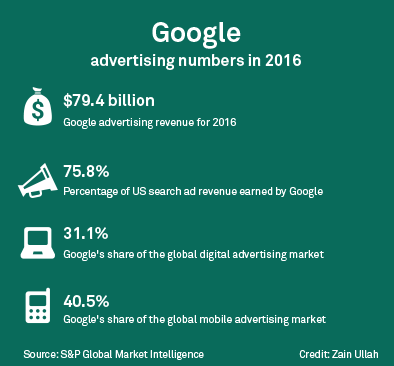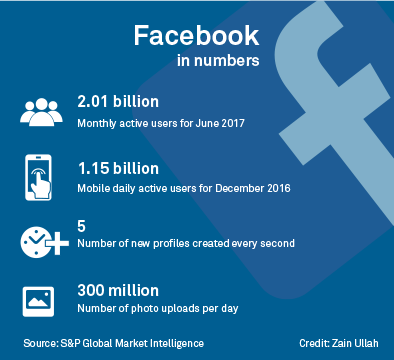This is the third installment of a multipart series on developments in the advertising technology market. Part 1 introduced a renewed push in targeted TV advertising, while part 2 explored private equity interest in the market. The final part, discussing fraud within the sector, will be published Aug. 17.
 |
Alphabet Inc.'s Google Inc.'s and Facebook Inc.'s digital advertising duopoly and combined earning power may have sparked a ruthless culling of the ad-tech herd in recent years, but observers believe much remains at stake for the swath of industry challengers.
Between them, the two California-based giants captured 20% of global ad spend across all media in 2016, up from 11% in 2012, according to media agency Zenith. Having fast emerged as the industry gatekeepers, Google and Facebook accounted for 64% of all growth in ad spending between 2012 and 2016, the firm said. Meanwhile, research firm eMarketer estimates that the big two ad giants are poised to take a 60% share of internet advertising in the U.S. market.
On the one hand, their dominance proves that scale is critical.
"Subscale companies are burdened with a lot of overhead expenses. They have fewer clients and less revenue to spread their costs across," Chris Kane, founder at programmatic consultancy Jounce Media, said in an interview.
 |
For instance, this year's creation of an ad-tech consortium comprised of AppNexus, LiveRamp, MediaMath, Index Exchange, LiveIntent and Rocket Fuel demonstrated that companies are responding to Facebook and Google's duopoly by teaming up into a larger operation.
However, the winner-takes-all dynamic in the market does not mean that only Google and Facebook can win, Kane argued.
Many believe Amazon.com Inc.'s extensive data may help it overturn the market's competitive dynamics, while Snapchat parent company Snap Inc.'s young audience is a major draw for advertisers.
In addition, Verizon Communications Inc. is betting on the combination of Yahoo and AOL Inc. to help it build an online advertising powerhouse while AT&T Inc. and Time Warner Inc.'s proposed $85.4 billion merger is a big bet on targeted ads.
Of these, there is clear evidence Amazon has the assets and scale to be a very credible competitor to Google and Facebook, Kane said. And even outside these industry giants, there are independent players that have achieved the scale that allows them to be "viable alternatives" for marketers and publishers, he added.
For instance, Kane noted that businesses on the supply side of the ad-tech market such as the recently floated Trade Desk, publicly traded Criteo and AppNexus — which is backed by tech heavyweights Ben Horowitz and Marc Andreessen — each pose a valid challenge to Google and Facebook.
 |
Independent industry analyst Jeff Kagan agreed, adding that there would be room for more success stories in the marketplace.
"In an industry like ad-tech, there can be many different winners and losers in many different segments or slices of the pie," Kagan said.
"Success stories like Facebook and Google are great, but they are just one slice of a very large pie," he noted.
Observers are equally optimistic about the prospects for smaller companies responding to niche market needs outside of Google and Facebook's growing market share.
There is a major opportunity for small to midsize marketers to gain access to a host of best-in-class programmatic ad-buying capabilities, according to Robert Brill, founder and CEO of Los Angeles-based marketing firm BrillMedia.co.
Brill noted that early stage self-service platforms such as Denver-based programmatic provider Choozle will be successful at drawing in small to mid-size marketers, agencies and advertisers to programmatic technology without the market's steep spending requirements.
At the same time, survival is brutal for this crop of smaller, private companies in the face of a venture capital investor funding drought, squeezed margins and the staying power of Google and Facebook's ad offerings.
Venture capital funding for ad-tech startups crashed to a five-year low in 2016, with the number of deals down 17% compared to 2015, according to research firm CB Insights. The investor exodus is largely due to the industry's two front-runners taking on more market share.
That said, the real gains await businesses that survive the ad-tech cull, according to Ratko Vidakovic, founder of Toronto-based ad tech consulting firm AdProfs.
"If you look at the overall pie of digital advertising dollars, Google and Facebook certainly dominate," Vidakovic admitted.
However, "the remaining slice of the pie for independent ad-tech is still a multibillion dollar market, which makes it attractive for whichever companies survive and win the most market share," he concluded.



